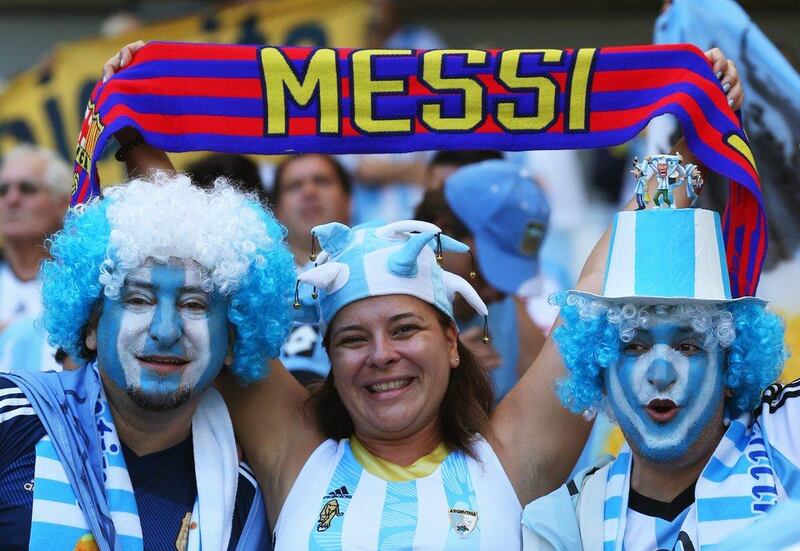Andy Mitten
“Brazil. Tell me how it feels to have daddy in your house?”
For 20 minutes after Lionel Messi had scored a brilliant, match-winning, injury-time goal, the Argentine masses refused to leave Belo Horizonte’s Mineiro Stadium.
The 2,000 Iranians drifted home, the 10,000 Brazilians too, but the 38,000 in blue and white on all four sides of the stadium stood and sang the same song over and again. It has become their anthem and was so loud you could not hear the public address system.
[ Click here to visit The National’s World Cup 2014 landing page ]
The Argentines danced as they sang, they held up their flags from their clubs – Boca Juniors, River Plate, Estudiantes, Newell’s Old Boys, Independiente – flags that Fifa do not allow to be displayed during matches.
Brazil aside, Argentina are the best-supported team at the World Cup. Geographic proximity helps for the first World Cup in South America since Argentina 1978. It makes the tournament affordable to anyone with enough money to share a long car journey or take an overnight bus trip.
Argentines in their team shirts and a backpack have been a frequent sight on the Brazilian bus network. They have considerable confidence in their own team to win the competition.
Argentines have never been short of self-assurance and, in their eyes, sophistication. Ask any of their neighbours and they will call it arrogance. They claim that Argentines love themselves more than anyone else, that they cannot be without a mirror.
With the greatest player in football and the pope from their country, it adds to their self-confidence and the economic problems that have long beset their nation are pushed aside for big events.
Long a regional superpower, they consider Brazil to be the poor son. Yet Brazil is now the undisputed economic Latin powerhouse. In football, the arguments between the neighbours will never cease.
Faced with taunting songs like the “Daddy” one, and impressed by Iran’s stoic defending, the neutral Brazilians went from singing their own songs to cheering for underdogs Iran.
By half time, they were starting chants of “Ole, Ole, Ole; Iran, Iran”. The Iranians were happy to join in and as the game went on, so the doubts arose among even the most cocksure Argentinians.
Iran may have made only 114 passes in the whole match, the lowest amount for 50 years in a World Cup, but after 90 minutes they were holding the best attack in football to a goalless draw.
Argentina’s fans were noticeably quieter by then, the critics ready to assault coach Alejandro Sabella once again.
Until Messi did what Messi does.
He changed the game – and won it – with a strike befitting his status as arguably the world’s greatest player. The watching Maradona applauded him as the one genuine successor to his crown. Iran’s players fell to the floor in anguish.
“That hurt,” said substitute Steven Beitashour. “That really hurt – and I was only on the bench. But what can you do about Messi?”
Iran leave the game with a credit they were not given before the competition started. They did not fade as expected and created better chances in the second half than the first.
Their assistant coach, Dan Gaspar, spoke with pride that, in his eyes, the man of the match was Argentina’s goalkeeper Sergio Romero.
“We knew that it would be a difficult, tense match,” Romero said. “Thank God I could get my hand on the ball” to make a crucial save from Ashkan Dejagah’s header in the second half, “and it didn’t go in. Messi then rubbed his magic lamp and we won.”
So Argentina started to sing, not cry.
sports@thenational.ae
Follow us on Twitter @SprtNationalUAE





